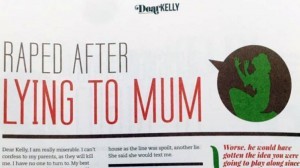A teen magazine in Singapore has come under harsh criticism by the public for publishing an advice column telling a young woman who wrote in to say that she’d been raped by a male acquaintance to be grateful her perpetrator had worn a condom.
In response to a teenage advice seeker, the “Dear Kelly” column in the November issue of Teenage told the girl she behaved “like a girl who has been around.”
The teenager had written: “I planned to stay with a boy I met… I was so excited and felt so grown-up. When I arrived, he had a gift waiting for me. … He grabbed me and kissed me. I pulled away.”
After a long evening that also included a “romantic dinner,” the young girl, who used a pseudonym, admitted that because she had had “too much to drink,” she was unable to resist the unnamed male’s advances, which included cuddling and kissing and … undressing me.”
Though she said she couldn’t recall what had happened after that, she recounted coming to the next day to find herself lying naked in bed next to the perpetrator, who apparently exclaimed: “Wow! I didn’t know you were a virgin, honey!”
In response to the teenager’s letter, the advice columnist pinned the blame on the girl, saying: “Unfortunately you gave him every indication you were a willing player in his seduction plan… I don’t blame him for thinking you were not a virgin. You acted like a girl who has been around.”
“Dear Kelly” added: “I can’t help but wonder how a poly student could be so naive? … You are expected to know what happens when a girl stays over at a guy’s house when only the two of them are in residence,” and concluded: “You should be grateful he wore a condom.”
Due to the public outrage the advice provoked in social media, the magazine expressed its regret, and the advice columnist Kelly Chopard, a teacher who had been writing the column for twenty years, apologized to the victim in a statement: “I sincerely apologize if my response to ‘Raped after lying to mum’ came across as harsh and ‘blaming the victim.’ Please believe me when I say I am profoundly sorry for teenagers who are vulnerable and often ‘naïve’ as I stressed, more than once, in my response in this case.”
Ask me anything
Explore related questions





